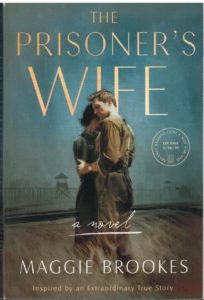 The Prisoner’s Wife by Maggie Brookes, Berkley imprint of Random House, ©2020; ISBN 9789593-197752; 400 pages, $17.
The Prisoner’s Wife by Maggie Brookes, Berkley imprint of Random House, ©2020; ISBN 9789593-197752; 400 pages, $17.

SAN DIEGO –The young wife dressed in men’s clothing, with her breasts tightly corseted. She shaved her head and pretended that shell shock had rendered her incapable of speech. Izabella and Bill, a British prisoner-of-war who had escaped from a lightly guarded Nazi-run work camp in Czechoslovakia, figured it was likely he would be recaptured, but if so, she was determined to be captured with him. And so they were, and so began the more intriguing part of the story.
 How does a young woman keep her secret among hundreds of men? She was in danger of being exposed every time she went to the latrine, or had a menstrual period, or tried to wash. She had to pretend to shave regularly so that the lack of stubble on her face did not raise suspicion. She had to mimic the way men walked. The fact was she couldn’t keep her secret alone, or with just with Bill’s assistance, however devoted he was. She had to let a small group of prisoners in on her secret and pray for their discretion and protection.
How does a young woman keep her secret among hundreds of men? She was in danger of being exposed every time she went to the latrine, or had a menstrual period, or tried to wash. She had to pretend to shave regularly so that the lack of stubble on her face did not raise suspicion. She had to mimic the way men walked. The fact was she couldn’t keep her secret alone, or with just with Bill’s assistance, however devoted he was. She had to let a small group of prisoners in on her secret and pray for their discretion and protection.
This is a remarkable story, cobbled by author Brookes from fragmentary information about a woman actually having survived in a men’s POW camp and from Brookes’ own rich imagination. While some men in the prison camp were devoted to her welfare – and in fact drew inspiration from her bravery – there were others who saw in her an opportunity for exploitation. She was the subject of blackmail and yes, at least one man schemed to rape.
Most of all, The Prisoner’s Wife is a story of endurance. Like other prisoners, Izabella, who took on the name “Private Cousins,” had to work. And like her fellow internees, she had to drag herself under guard in bitter cold weather to other camps farther from the advancing Russian front. Whoever believes men are naturally better than women to survive such hardships will find their prejudices disappointed by this tale.
Among the men who assisted her was Max, a Jewish soldier who quarreled with Bill after learning that, prior to his enlistment, he had been captivated by the anti-Semitic rhetoric of Sir Oswald Mosley, a fascist and Hitler wannabe in Britain. Even though Bill apologized and admitted how stupid such thinking was, Max could not bring himself immediately to forgive him. However, as the prisoners faced increased starvation and privation, the two men allied themselves to help assure their survival and that of Izabella.
In this book, Max is treated no better, no worse, than the other British POWs, notwithstanding that he was a Jew. At one work camp, where the prisoners quarried marble, it was suggested that the owner – a Mr. Rohrbach, who was kind to the prisoners – was himself a secret Jew, terrorized by a brutal Nazi overseer. There are references as well to the POWs being aware that the horrible smelling smoke that sometimes drifted into their camp came from the nearby crematoria of a Nazi death camp where European Jews had been sent. This is not a story about the Holocaust but what treatment of the European side of World War II would be complete without some reference to it?
*
Harrison is editor of San Diego Jewish World. He may be contacted via donald.harrison@sdjewishworld.com